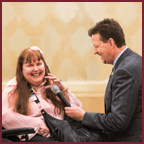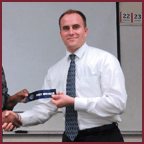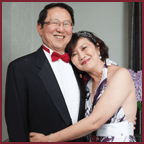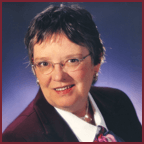Overcoming Obstacles

Five members share the life-changing events that shaped their lives.
By Toastmaster Magazine Staff
From the Toastmaster January 2016.
Everyone struggles with obstacles and setbacks. A loved one dies, your health deteriorates, your marriage is no longer what it once was.
Whether you’re wrestling with fears, a physical ailment, mental roadblocks or emotional battles—you are not alone. Life is full of unexpected hurdles, and as Toastmasters, you not only have an outlet to share these stories in your speeches, you have a room full of people who become your biggest supporters.
The five members profiled in this article encountered life-changing experiences. Toastmasters helped them overcome their obstacles—and inspire others in the process.
A Poet Regains Her Voice
 Karen “K” Locke | ACS | CL
Karen “K” Locke | ACS | CL
As a teenager in 1963, Karen “K” Locke found her poet’s voice, and she dedicated her life to writing and reciting poetry until a tragic day in 2003, when she was debilitated by a stroke. An advocate for racial equality through her poetry for many decades, she became silenced for the next six years. “It was as though the password to my mind had been lost—I had information stored but could not access it,” Locke says. “I could not speak, I could not write. I became a prisoner looking out through eyes that could see, I was locked inside a body that could barely move.”
One late afternoon in 2010, the phone rang. It was her ex-husband, Patrick. After 25 years of separation, the two came together again. Patrick was a Toastmaster, and he told Locke that joining a club might help her regain the ability to recite her poetry. She was scared, but hopeful.
At the first few meetings of the Early Words Club in Longview, Washington, Locke struggled with broken speech and filler words. But the club members waited patiently until she completed a word. When applause erupted, Locke found encouragement to keep going. She was scheduled to give her Ice Breaker just a few weeks later.
“I did not expect the Ice Breaker to come up so fast,” she says. “I didn’t feel ready, but everyone assured me I could do it. We recorded a video of the speech, which I later used to secure an invitation to recite my poetry at the dedication of the Martin Luther King Jr. Memorial in Washington, D.C., in 2011.”
In 2015, Locke entered the International Speech Contest and earned second place at the division level. A few months later she attended the International Convention in Las Vegas, where she says she experienced an encounter unlike any other, connecting with members of various nationalities and all walks of life.
“We all have challenges in our lives,” she says. “We can choose whether or not to pick up the tools that are out there. Thanks to Toastmasters, I’m getting well, and I have my poet’s voice back!” Karen’s experience has led her to produce the illustrated book How Did You Choose the Colors, Lord, which will be available through Amazon.com early in 2016.
A Stutterer’s Journey
 Ken Bevers | CC
Ken Bevers | CCFor Ken Bevers, ordering food at a restaurant used to involve an exhausting inner battle. He would think to himself, I think I can say salad, but that doesn’t sound very good. Should I order pasta instead?
Bevers’ stutter was mild until he started college. He often experienced a “silent block,” where his diaphragm tightened from fear, preventing him from speaking. He could say some words without stuttering and sometimes hide the disorder.
“Imagine every day as a chess game where if you make the perfect move, then you can get by without too many blocks, but one wrong move and you may lose your confidence and spiral down into a depression,” says Bevers. “At the end of the day, I was exhausted.
“I experienced a lot of guilt, shame and fear from avoiding certain words and situations. My stutter definitely brought me to very low moments. But that was then.”
He recounts the most awkward thing he ever did: In college, he had to introduce himself at his fraternity’s recruitment event and welcome guests, but he froze. After a long delay he finally said, “A…nd I…I’m Ken.” He was embarrassed, but determined to find help.
Bevers explored many venues, including Toastmasters. The Bluejacket Toastmasters club in Shawnee, Kansas, welcomed him and he realized he could be a successful speaker, but he believed he still needed additional help.
He then joined the McGuire Program, an intensive three-day course that teaches people who stutter to speak from their costal diaphragm and to voluntarily stutter. The program also encouraged him to confront his fear head-on—by going to busy public places like shopping centers and introducing himself to strangers. His introductions included telling people that he stutters. The Kansas City Star newspaper published an article last July about his brave strategy.
After finding his voice in the McGuire Program, Bevers returned to the Bluejacket Toastmasters to shape it. Now president of the club, he has grown into an effective, articulate speaker. His latest accomplishments include delivering toasts at two weddings, one for his sister and the other for his best friend. Bevers also serves as a certified coach for the McGuire Program, providing support to new graduates. He even was promoted to senior auditor at the accounting firm he works for.
“The idea that someone who stutters can be inspired by my story,” says Bevers, “means a great deal to me.”
A PIP’s Inspiring Path

George Yen | DTM
These days, George Yen is a happy, accomplished and fulfilled man. He has a beautiful family and is a highly successful businessman in Taipei, Taiwan. In Toastmasters, he climbed the ladder of leadership to the organization’s highest position, serving as International President in 2013–14.
But it wasn’t always that way.
In 1988, Yen was, by his own admission, at the lowest point in his life. The import business he had founded eight years earlier in New York City was floundering. His marriage of 17 years was collapsing. He felt adrift, suddenly without “the two pillars of family and business success on which I built my sense of self.”
Yen knew he needed to start over, so he returned to his homeland, Taiwan. He faced daunting obstacles. “I had to regain my footing and re-establish a sense of who I was,” he says. A pivotal step in that journey was joining Toastmasters. Practicing public speaking in the safe environment of club meetings, he felt good about himself again. His downward spiral was reversed.
“The confidence that comes from speaking in front of an audience is magical—it permeates our whole being,” says Yen, now a member for 26 years.
That new confidence, he adds, transferred over to his social and professional life. His “crowning achievement” was meeting and marrying fellow Toastmaster Jorie Wu, DTM. The couple has a daughter, Keli Yen, also a DTM.
After joining Toastmasters, George says, he learned leadership lessons that, combined with his business experience, formed the cornerstone of his subsequent success. He is now chairman of the board of Great Sequoia Corporation, an international management and trading company based in Taipei. In addition, he serves as the chief executive officer of five international joint ventures in the fields of machinery and industrial products.
Yen, a member of Leadership Village Toastmasters in Taipei City, says Toastmasters not only helped him with communication and leadership skills, but also served as a “practice field for life,” giving him the self-awareness to overcome obstacles.
“It is a given that adversity is part of life,” he says. “How we deal with adversity is the name of the game.”
Learning to Live Differently-Abled
 Prabhu Kandasamy | CC
Prabhu Kandasamy | CC
In August 2015, Prabhu Kandasamy walked on stage at the International Convention in Las Vegas and began singing the words of a song by R&B performer R. Kelly, “I believe I can fly. I believe I can touch the sky.” With his speech, “Differently-Abled,” he placed third in Semifinal 4 of the Toastmasters International Speech Contest Semifinals.
Walking anywhere defies what Kandasamy’s doctors said before he reached the age of 2. He was a child with post-polio paralysis, and they believed he might never walk. As the boy grew older, he believed it too. His mother’s words stayed with him: “Face life with courage.” There is no cure for polio. But after three years of physical therapy, Kandasamy finally walked—on his own—out of a hospital in Bengaluru, India.
Next he was placed in a boarding school in Tamil Nadu, India, where the principal recognized Kandasamy’s talent and said that he would be a great orator. Kandasamy shared his stories and developed friendships—and the ability to accept himself for who he was.
But walking remained difficult, and by age 16 he had undergone four surgeries. While he was recovering from one of them, a woman in the hospital told him he had a beautiful smile. That’s when he realized he was “differently-abled.”
But walking remained difficult, and by age 16 he had undergone four surgeries. While he was recovering from one of them, a woman in the hospital told him he had a beautiful smile. That’s when he realized he was “differently-abled.”
“I was no longer restricted by limited beliefs,” he says. He became a communication engineer and worked with a range of technologies. His employer in India sent him to Dallas, Texas, as a consultant. “I met a lot of people from various countries and had amazing new experiences,” he says. “So later when I got an opportunity to move back [to the U.S.], I took it.”
He accepted a position at Qualcomm in Southern California. He began dating and met Polina, his future wife. He joined Toastmasters of La Jolla, near San Diego, California, after Polina encouraged him to speak about his experiences. “I never thought anybody other than friends and family would be interested in hearing me speak,” he says.
Kandasamy’s courage and confidence has brought him to San Diego, far from India, where he was born, and far from the self-imposed belief that a physical condition could control his fate. His message applies to anyone: “Never let your body control your mind. Don’t be restricted by limited beliefs. Always remember: You are defined not by what you cannot do, but by what you can do.” And in Toastmasters he is doing more and more to spread his message of encouragement.
“I felt even more empowered to get out of my hospital bed, pull myself up by the ‘boot straps’ and re-engage in life and my Toastmasters journey."
Finding a Will and a Way

Val Albert | DTM | PID
While attending the 2006 International Convention in Washington, D.C., Val Albert went back to her hotel room after a full day of sessions, speakers and member interaction to find it stocked full of watermelon.
Watermelon, she says, was all she could eat due to the chemotherapy treatment she was undergoing to battle her cancer. Her Toastmasters friends had quietly gathered plates of the food and put it there, knowing it might help.
Ten years ago, Albert was at the top of her Toastmasters game as a member of North Country Club in Glenn Fall, New York. Already a 15-year member, she was in the middle of fulfilling her aspirations in leadership by running for a spot on the Board of Directors. Then the news came: Cancer. Stage 1.
However, within three weeks of her diagnosis, her cancer had metastasized and she found herself facing stage 3 of the disease.
“I could have, and was very tempted to, curl up and shut the world out,” she says. “But once I realized how important it was for me to serve my organization and the members I love so much, it changed my life. I felt even more empowered to get out of my hospital bed, pull myself up by the ‘boot straps’ and re-engage in life and my Toastmasters journey.”
Part of running for the Board includes traveling to the International Convention to engage with members face-to-face—but only Val’s campaign team knew she had cancer at the time. Every morning, a Toastmasters friend helped her dress, including ensuring that her wig was secured so her “hair” looked good. Throughout the day, her team kept her hydrated. And every evening, another friendly member took her by the arm and walked her to her room.
“Those Toastmasters probably never realized that their compassion, and yes, servant leadership, were part of a process that ultimately saved my life,” Albert says.
Her advice to others who struggle with an obstacle is to keep an open perspective. “When you are suffering, make sure that you expand your optics and don’t gaze inward, because you may miss an opportunity of a lifetime,” she says. “Reach out to fellow Toastmasters, because this organization is far greater than speaking and leading, it is humanity making a difference in everyday challenges and changing attitudes and outcomes for individuals across the globe.
For more articles from the January issue, visit www.toastmasters.org/Magazine/Issues.
